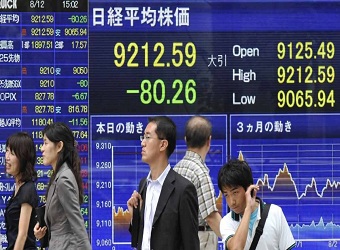Asia markets were under pressure on Thursday, with Japan’s Toshiba tumbling on credit downgrades while Takata soared as it nears a settlement with the U.S.Department of Justice related to faulty airbags for vehicles.
Japanese benchmark Nikkei 225 dropped 1.21 percent, likely due to pressure from a stronger yen.
Shares of Toshiba were down 19 percent at 252.3 yen each, fast approaching the Tokyo exchange’s daily downward limit. The Tokyo stock exchange has different daily price limits for stocks, based on a tiered system.
On Wednesday, both Moody’s and S&P Global Ratings downgraded Toshiba credit ratings and put the electronics conglomerate on ratings watch with negative implications.The downgrades come after the Japanese firm announced Tuesday it might have to recognize several billion dollars in write-downs related to its U.S.-based nuclear plant construction company acquisition.
Takata shares were positive amid a sea of red, trading up 16.47 percent or 100 yen to 707 yen each to hit its daily price limit. The airbag maker’s shares rose on overnight news that it was nearing a settlement with the U.S. Department of Justice (DoJ) and is expected to pay up to $1 billion to resolve allegations of criminal wrongdoing related to its faulty air bag inflators, Reuters said, citing the Wall Street Journal.
Down Under, the ASX 200 was nearly flat, down 0.01 percent, weighed strongly by a 1.28 percent loss in its utilities sub-index.
South Korea’s Kospi was lower 0.07 percent.
South Korea’s finance ministry also revised its 2017 gross domestic product forecast for 2017, down to 2.6 percent from 3.0 percent earlier. Seoul also reported that industrial output jumped 3.4 percent in November from the previous month, its strongest monthly gain in almost seven years.
Mainland Chinese stocks slipped in early trade, with the Shanghai composite down 0.3 percent and the Shenzhen composite off 0.283 percent. Hong Kong’s Hang Seng dipped 0.31 percent.
Hong Kong’s November trade figures are also on tap.
Over at Wall Street, major U.S. indices tumbled as the possibility of the Dow reaching its psychological 20,000 mark before the year ends grew increasingly elusive.
The Dow Jones industrial average finished down 0.56 percent at 19,833.68, the S&P 500 closed 0.84 percent lower to 2,249.92 and the Nasdaq composite finished down 0.89 percent to 5,438.56.
“U.S. indices pulled back from all-time highs, and currencies and commodities largely marked time as professional investors tweaked market exposures,” said Michael McCarthy, chief market strategist at CMC Markets, in a note on Thursday.
In currency markets, the Japanese yen strengthened against the dollar, fetching 116.71 as of 12 pm HK/SIN, compared with levels above 117.44 yesterday. The Australian dollar remained below $0.72 seen last week, at $0.7199. The South Korean won also firmed up against the dollar, at 1,207.7.
The dollar index, which measures the greenback against a basket of six major currencies, last traded at 103.04.
The Chinese yuan was trading at 6.9545 against the dollar as of 12 pm HK/SIN, The daily yuan midpoint was set lower at 6.9497, compared to its last close at 6.956.
The People’s Bank of China dismissed a media report late on Wednesday that the yuan had weakened beyond the 7.0000 per dollar level in the onshore market on Wednesday, and called the report “irresponsible” in its microblog.
The yuan has seen persistent pressure on the back of large capital outflows, and has depreciated 6.46 percent year-to-date against the greenback.
U.S. crude futures were last trading down 0.39 percent at $53.85 a barrel, while Brent futures inched up 0.05 percent at $56.25.
Oil prices had gained on Wednesday in the U.S. for the fourth straight session, but turned negative in post-settlement trade after American Petroleum Institute data showed a surprise build in U.S. stockpiles.
Source: CNBC


